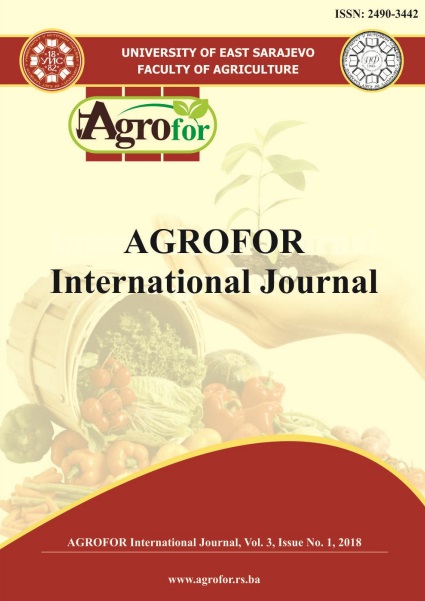IN VITRO EFFECTS OF ACINETOBACTER BAUMANNII AND SELECTED NATURAL BIOMOLECULES ON RABBIT SPERMATOZOA MOTILITY
DOI:
https://doi.org/10.7251/AGRENG1801054TAbstract
The aim of this study was to assess the potential efficiency of selected biologically
active substances on the motility behaviour of rabbit spermatozoa subjected to in
vitro induced A. baumannii contamination. The semen samples used for A.
baumannii detection were collected from 10 New Zealand white male rabbits and
the presence of the bacterium was confirmed using MALDI-TOF Mass
Spectrometry. For the in vitro experiments rabbit spermatozoa were re-suspended
in PBS, containing mineral supplements, BSA and glucose in the presence of 3x105
CFU A. baumannii and diverse concentrations of selected biomolecules (resveratrol
- RES, quercetin - QUE, curcumin - CUR, epicatechin - EPI, isoquercitrin - ISO).
The sperm motility was assessed using the computer-aided sperm analysis at 0h,
2h, 4h and 6h. A. baumannii significantly decreased the sperm motility (P<0.001)
at Time 2h and maintained this negative impact throughout the in vitro culture.
Meanwhile, the motility at Time 2h was significantly higher in the samples subjected
to A. baumannii together with 10 μmol/L RES (P<0.01); 5, 10 and 50 μmol/L QUE
(P<0.001); 1 μmol/L CUR (P<0.05); 10, 50 and 100 μmol/L EPI (P<0.01) as well as 50
μmol/L (P<0.05) and 100 μmol/L ISO (P<0.001) in comparison to the control exposed
to the bacterium exclusively. After 4h, the motility remained significantly higher in the
groups co-treated with the inoculum and 10 μmol/L RES (P<0.05), 50 μmol/L QUE
(P<0.05) as well as 50 μmol/L EPI (P<0.05) when compared to the positive control.
Nevertheless, none of the biomolecules was effective against the rapid decline of
sperm motility caused by A. baumannii during later stages of the experiment (Time
6h). Based on these results, one can conclude that RES, QUE and EPI exhibit
antibacterial properties providing a selective advantage to spermatozoa in the
presence of A. baumannii, particularly during short-term rabbit semen handling.

